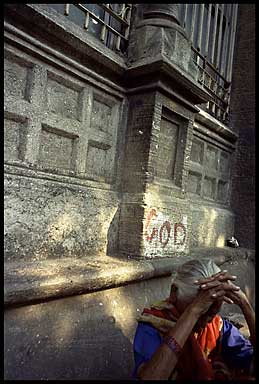Swingin For the Cheap Seats

I live next to a temple. To get to my house I have to go past the Babulnath Mandir Chowk. There's so much shit going on there that it would take me about 400 pages to describe 10 minutes. I don't even know the whole story. Most of it looks like plain old buying and selling. I can't understand most of what people are saying. I've gotten used to having no language but I'm still trying to hear. For the past 3 days I've studied Hindi for 2 hours out on my terrace after I woke up. Words are starting to separate out from the song that I hear people singing all day long. Language is not my strong point. Writing, however, mujhe likhna pasand hai. It is my act of devotion.
I was sitting on my bed reading my guidebook, deciding where I should take a trip to, Mandu, Varanasi, Katmandu, and some places where Siddharta Gautama ran around. And I was thinking about the places I've been interested in here in India and I realized that I'm sticking mostly to religious places. Then I thought about why I wanted to come here in the first place. I was pulled here because of the philosophical and spiritual stuff I'd read when I was 18 or 19. Since then, my attention has been focused on the place like a pilgrim. I, like many pilgrims, was too poor to come here in my 20's. India developed an exotic and beautiful aura over the years.
All the same, I didn't get the urge to come here until I started going to other places. I moved away from home. When I figured out how different things could be in a different place where the same Bible was in the motel bed stand and the same shows were on TV every night, I wanted to come here and see how different it was. The philosophy produced here is completely different than the stuff that came from the place where I lived. Did that mean the place is different?
My 20's were spent voraciously consuming and critiquing western culture, becoming ultra-hipster-boy and basically mentally marginalizing myself from the ordinary people. It's a tired old story - becoming an expatriate in your own country. I sat down tonight at my Sony expecting to write about the spiritual traditions of India, the way I see them manifested in the culture, and the new balance in my mind between the culture and philosophy of this place. But what happened along the way, and what happened in my 20's in the USA, is that the philosophy dissolved into culture and "Hinayana" became something like "Hat rack". After I left the black-and-whiteness of my adolescence behind, I was no longer able to separate out the two. I couldn't think about a person and say, "Oh they're not acting like a Christian" or make any connection between the way books described the world and what I saw.

Which brings me to Babulnath. Literally.
So what makes me think I can say anything about this place and its people? The longer I stay here, the more this place just *is*. I just read that David Hume said that whenever he was forced to conclude, at the end of a long bout of reasoning, that his empirical ego was insubstantial, he went out for a walk, had a good dinner, and forgot all about it. I think that's what I'll do.
I'm back.
For example, take my 12:30am walk down to Shiv Sagar to get a veggie sandwich and freshlimesoda just now. You'd be hard-pressed to find any apparent symbols of the 2500-year-old philosophy that brought me to this place: an over-aggressive street dog, drunk teenage punks inhaling Pau Badji, a man sleeping under a folded up human-powered street Ferris wheel. Maybe the philosophy, that I was only thinking before, is actually seeping into me. Maybe I am becoming Indian. The abstractions of ancient philosophy do not mean much for the millions of Hindus here. I doubt they ever did. This is amazing to me, because they have the most potent philosophy I've ever encountered. The world that I just experienced: the dog, and the drunks and the man, are the expression of that. They're all "eternally informed by God, who can be met face-to-face in all things".
This is shit I knew before I came of course. To a person of more western beliefs, this might seem like it cheapens divinity. That if you put God everywhere, then you've infinitely diluted "him" and then what's the point of there being a God? God is God, after all, because he is all knowing and all powerful and merciful and all that good stuff. The world is ugly and unfair and decidedly ungodly. And who's gonna enforce the rules?
The Chandogya Upanishad says over and over, "Tat tvam asi." Which translates to "Thou art That." This is the unity of the universe that all modern science describes, and for me is wickedly potent and direct. The self in each person is not different from the God-head. This is Advaita Vedanta. The teaching of non-duality. I wanted to come here because I believed that a culture that believed this didn't kill or dilute God but just spread a thicker layer of God all over everything. Mmmm tasty.
So now that I'm here, what's the point of traveling to these religious "hot spots"? Hell if I know. Why'd I even come here in the first place? That I do know: because, unlike my own culture, this is a culture based (no matter how loosely) on a philosophy that I actually believe in.
What's with all the Elephant-God stickers and sacred cows you might ask. That is the balance. And things stay balanced in my thoughts. The brain works on duality. Shiva, the god that is worshipped at Babulnath Mandir, is a beautiful duality, part monk, part gigolo, creator and destroyer. I have to balance philosophizing and ritualizing. For most Hindus, worship, or puja, is an integral part of their life. The real estate broker who gave me a ride on his motorcycle across town kept taking his hands off the handlebars (at what I thought were inopportune moments) so that he could fold his hands and perform a little puja as we zoomed by a shrine. He did it at every one (every couple of blocks) as if they were religious speed bumps.
Acts of devotion like this, or burning incense or making offerings in your household shrine are often aimed at the granting of favors or meeting immediate needs of life. "Help me pick a good husband for my daughter, get me a good job, give me good health, make my next child a boy!" When I encountered this stuff, I thought, "Oh, it's just the same old selfishness and short-sightedness that I usually see in humans." It's as if people only pay now in hope of some reward later. Hinduism in practice looks like a cosmic lottery or stock market.
The contradiction I see in Hinduism is that next to all this idle worship, the philosophy that attracts me to it proclaims renunciation. Work hard in the world, without any selfish attachment and you will purify your consciousness of self-will. Attachment to the fruits of your labor is what keeps you from realizing that you already are a part of everything. Gandhi summed up his life in three words: "Renounce and enjoy." Only a person who is utterly detached and utterly dedicated is free to enjoy life. The crucial distinction is that this is not withdrawal from life but a mental discipline. And, it's not simply to be without desire, desire is good and necessary, but without *selfish* desire. Because you have the right to work but not the fruits of it. This is the philosophy that no one reads. And, as Jairaj, that guy who watches over the spiritual center told me, it's "high frequency knowledge" that is too much for his common brain to handle. He prefers to drink his own urine.
In the Bhagavad Gita, Lord Krishna, one of the "10,000 faces of God", tells Arjuna to surrender everything to him in love. In chapter 9 he says, "Whatever you do, make it an offering to me." This is the same thing as renunciation. Everything is to be done and given and endured and enjoyed for the sake of the the God in alll, not for ourselves.
This is sometimes reduced to a base psychological reaction: religion gives you something to blame other than yourself for your problems, and someone else to count on for solutions. It's the all that stuff that gives religion a bad name in the US. All religions are equally distasteful in this way but something about Hinduism (and Buddhism for that matter) makes it OK. There are Muslims in India and I don't give them this break.

Here's the difference: tolerance. Tolerance is at the core of the philosophy and when it is manifested in the culture, I see people behaving righteously. Tolerance in any other philosophical / cultural context where it has no underpinnings is just a happy mistake. I'm sure any group in the shadow of Hinduism (Muslims and women come to mind) is ready to point out the brazen injustices focused on them by the Hindus. I said *when* tolerance is manifested in the culture, not that it always is.
I'd like to quote from C Rajagopalachari. He can help me point out that tolerance is a distinction that marks Hinduism sharply from the monotheistic faiths.
The philosophy of Hinduism has taught and trained the Hindu devotee to see and worship the Supreme Being in all the idols that are worshipped, with a clarity of understanding and an intensity of vision that would surprise people of other faiths. The Divine Mind governing the Universe, be it as Mother or Father, has infinite aspects, and the devotee approaches him or her, or both, in any of the many aspects as he may be led to do according to the mood and the psychological need of the hour.
So the tolerance is in the cows and the tolerance is in the Bhagavad Gita. I think there is less God spread around America because there is less tolerance for different views of God. All of that selfish crap going down in front of Babulnath temple looks different in this light. Because Hinduism has shown me my saving grace: original goodness. And the philosophy dissolves. And I forget about it, like David Hume and like all the Hindus performing their memorized rituals.
- Intro
- Angeles, Take Two
- Inflights
- In de pendence day
- Showermaster
- Read Here for Information on India
- Mani Bhavan Gandhi Sangrahalaya
- I Live in a Treehouse
- Random Stuff About This Place
- Straws, Bucks and Lawns
- Coming and Going
- Any Ol' Punk Will Do
- The View from Swaraj Terrace
- Freshlimesoda
- No Bowling Alleys or Prostitutes in This One
- Bowling Alleys: Only For the Young, Rich and Bored-Trendy.
- <meta name='keywords' content='sex, sex, sex, sex, sex'>
- I Met some Boys On a Train to Pushkar
- I Met some Boys On the Street in Pushkar
- Bus-tin a Move
- Pinky Eyes, They're Watchin You, They See Your Every Move
- What You Write when You're in a Sleeper Car
- Birthday Boy
- Movie Review
- Pretty Long, but Every Word the God's Honest Truth
- Givin Props
- Sticking With Strict Chronological Order, Here It Is
- Here's some more
- German Optics
- Shopper's Alert
- Eleanor
- Compassion
- Multi-Infarct Dementia
- Let us now praise protocol pioneers
- Thirty Four
- Cookie Cutter
- What Does Your Soul Look Like?
- Bye Bye, Swaraj Terrace
- Long, Boring Writing About a Short, Exciting Skateboard Ride
- Swingin For the Cheap Seats
- Request Timed Out
- Ah, Bed. "With Two Mattresses, Please."
- Giving Birth
- Momma, Don't Let Your Babies Grow Up
- Ticketmaster
- This Journal Cost Me Sixty Dollars
- The Mahanagari Express
- We Got a Floater!
- Kiss My Holi Ass You Punks!
- Better Yet, Kiss My Diseased Holi Ass, You Punks
- Indian Beauty
- Exhibition Cum Sale
- The Puff Guide
- Man Surrounded by Tea: "Let's See some Magic Folks!"
- Sikkimese Graffiti
- Pelling Hotel Play-By-Play
- Brrrickfist Sah?
- Singapore Slingshot
- The Situation Is Right for a Lovely Fight
